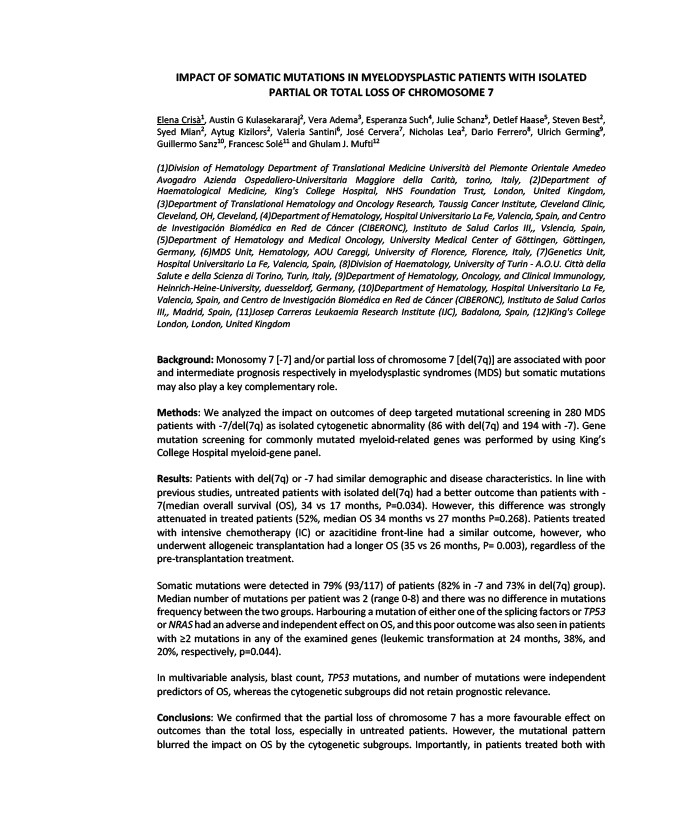
IMPACT OF SOMATIC MUTATIONS IN MYELODYSPLASTIC PATIENTS WITH ISOLATED
PARTIAL OR TOTAL LOSS OF CHROMOSOME 7
Elena Crisà1, Austin G Kulasekararaj2, Vera Adema3, Esperanza Such4, Julie Schanz5, Detlef Haase5, Steven Best2,
Syed Mian2, Aytug Kizilors2, Valeria Santini6, José Cervera7, Nicholas Lea2, Dario Ferrero8, Ulrich Germing9,
Guillermo Sanz10, Francesc Solé11 and Ghulam J. Mufti12
(1)Division of Hematology Department of Translational Medicine Università del Piemonte Orientale Amedeo
Avogadro Azienda Ospedaliero-Universitaria Maggiore della Carità, torino, Italy, (2)Department of
Haematological Medicine, King's College Hospital, NHS Foundation Trust, London, United Kingdom,
(3)Department of Translational Hematology and Oncology Research, Taussig Cancer Institute, Cleveland Clinic,
Cleveland, OH, Cleveland, (4)Department of Hematology, Hospital Universitario La Fe, Valencia, Spain, and Centro
de Investigación Biomédica en Red de Cáncer (CIBERONC), Instituto de Salud Carlos III,, Vslencia, Spain,
(5)Department of Hematology and Medical Oncology, University Medical Center of Göttingen, Göttingen,
Germany, (6)MDS Unit, Hematology, AOU Careggi, University of Florence, Florence, Italy, (7)Genetics Unit,
Hospital Universitario La Fe, Valencia, Spain, (8)Division of Haematology, University of Turin - A.O.U. Città della
Salute e della Scienza di Torino, Turin, Italy, (9)Department of Hematology, Oncology, and Clinical Immunology,
Heinrich-Heine-University, duesseldorf, Germany, (10)Department of Hematology, Hospital Universitario La Fe,
Valencia, Spain, and Centro de Investigación Biomédica en Red de Cáncer (CIBERONC), Instituto de Salud Carlos
III,, Madrid, Spain, (11)Josep Carreras Leukaemia Research Institute (IJC), Badalona, Spain, (12)King's College
London, London, United Kingdom
Background: Monosomy 7 -7 and/or partial loss of chromosome 7 del(7q) are associated with poor
and intermediate prognosis respectively in myelodysplastic syndromes (MDS) but somatic mutations
may also play a key complementary role.
Methods: We analyzed the impact on outcomes of deep targeted mutational screening in 280 MDS
patients with -7/del(7q) as isolated cytogenetic abnormality (86 with del(7q) and 194 with -7). Gene
mutation screening for commonly mutated myeloid-related genes was performed by using King’s
College Hospital myeloid-gene panel.
Results: Patients with del(7q) or -7 had similar demographic and disease characteristics. In line with
previous studies, untreated patients with isolated del(7q) had a better outcome than patients with -
7(median overall survival (OS), 34 vs 17 months, P=0.034). However, this difference was strongly
attenuated in treated patients (52%, median OS 34 months vs 27 months P=0.268). Patients treated
with intensive chemotherapy (IC) or azacitidine front-line had a similar outcome, however, who
underwent allogeneic transplantation had a longer OS (35 vs 26 months, P= 0.003), regardless of the
pre-transplantation treatment.
Somatic mutations were detected in 79% (93/117) of patients (82% in -7 and 73% in del(7q) group).
Median number of mutations per patient was 2 (range 0-8) and there was no difference in mutations
frequency between the two groups. Harbouring a mutation of either one of the splicing factors or TP53
or NRAS had an adverse and independent effect on OS, and this poor outcome was also seen in patients
with ≥2 mutations in any of the examined genes (leukemic transformation at 24 months, 38%, and
20%, respectively, p=0.044).
In multivariable analysis, blast count, TP53 mutations, and number of mutations were independent
predictors of OS, whereas the cytogenetic subgroups did not retain prognostic relevance.
Conclusions: We confirmed that the partial loss of chromosome 7 has a more favourable effect on
outcomes than the total loss, especially in untreated patients. However, the mutational pattern
blurred the impact on OS by the cytogenetic subgroups. Importantly, in patients treated both with